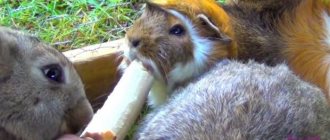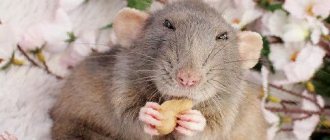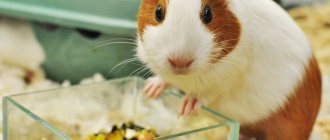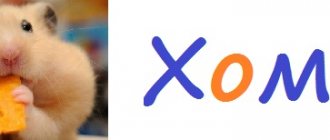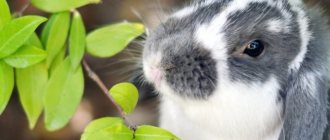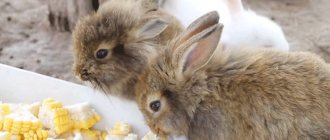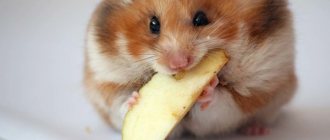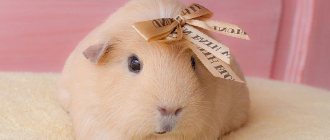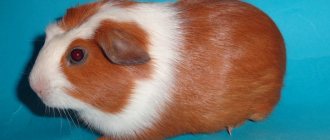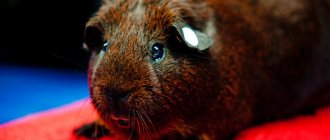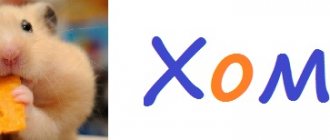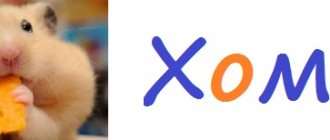The guinea pig is a very interesting pet that needs good care and company. The diet should include food that they consume in the wild. This is the only way to maintain strong immunity and normal functioning. You need to know what guinea pigs eat before purchasing one. Proper nutrition is extremely important and the health and life of the animal will depend on it. For starvation, 1–2 days without food is enough.
Feeding rules
These are herbivores that consume up to 150 g of food per day. They eat mainly hay and vegetables. The daily menu for pets should include:
- 10% dry food;
- 30% greens and succulent feed;
- 60% hay.
The diet of guinea pigs should be varied as much as possible. Eating the same type of food can lead to a deficiency of beneficial vitamins and minerals.
Important! Animals have a weak digestive system. Their stomachs react sharply to chemicals and poor quality food. To avoid health problems, you should feed your guinea pig at home only environmentally friendly products.
Animals often leave food and return after some time to finish eating. Therefore, you need to constantly check that there is no spoiled food in your pet’s bowls.
You need to feed your guinea pig 3 times a day. She should eat green food before lunch and dry food in the evening. The animal’s digestive system is designed in such a way that there must always be food in it. A hunger strike causes the stomach to stop working. And if a pet does not eat for 18-20 hours, it may die.
What to feed a pregnant guinea pig and newborn babies
Pregnant rodents need high-quality and nutritious nutrition. Rose hips, which are served to pets in the form of an infusion, are very beneficial for the body. You should also include wheat sprouts, beets and fresh carrots in your daily diet.
The diet of newborn pigs should contain foods rich in vitamins and proteins. For the first two weeks, babies feed on mother's milk. If it is missing, the owner will have to feed the small offspring; it is better to consult a veterinarian for advice.
Already from the second day of life, little guinea pigs begin to try different foods, so it is necessary to ensure that the cage contains:
- Juicy;
- Greens;
- Industrial feed.
Hay
Due to the special structure of the gastrointestinal tract, the nutrition of guinea pigs must be organized so that they can eat hay every day. This is their favorite food, which stimulates the digestive system and prevents the occurrence of intestinal diseases. You can purchase it at a pet store or prepare it yourself.
When choosing purchased hay, it is important to pay attention to its aroma. It should smell like grass, not damp.
You need to carefully ensure that the hay that guinea pigs eat does not contain large, coarse twigs, dust or other contaminants.
If you wish, you can feed the animals with your own prepared hay. It is recommended to collect raw materials for it away from swamps, highways and industrial enterprises. You need to dry the grass for the winter for at least 1.5-2 months, and it should not turn black or turn black.
On a note. It is especially useful to feed the rodent legume-cereal and bean hay. It contains all the vitamins a guinea pig needs.
Healthy Supplements
Not only food of plant origin helps the guinea pig to receive the maximum of beneficial elements for the body. Various nutritional supplements can also come to the aid of grass and twigs.
If you want to pet a guinea pig, be sure to handle it the right way.
Such additives include:
- meat and bone meal. This product allows the animal to compensate for the deficiency of animal proteins;
- fish fat. Mainly given to young animals to strengthen bones and increase the amount of vitamins for growth in the body;
- boiled milk. It is used most often for feeding young animals. It must be fresh. A product without heat treatment can introduce infection into the animal’s body;
- water. Of course, this is not a supplement, but something that is vitally necessary for all living beings. Especially in winter, when feeding will be carried out with dry food and dry hay;
- ascorbic acid. The body does not produce vitamin C, so its level should be replenished with ascorbic acid;
- feces. For rodents, eating their own feces is almost the most important aspect in maintaining their intestinal microflora. In addition, it is an additional source of microelements.
Green feed
In addition to hay, the animal loves to eat green food. They minimize the risk of developing diseases of the digestive system and saturate the body with useful substances. Guinea pigs can eat celery, mint, spinach, basil, dill, parsley and arugula.
They eat tansy, yarrow, chamomile, plantain leaves, clover, young sedge and dandelions with appetite. It is also recommended to introduce sprouted grains, cilantro, carrot tops, turnips and beets into the guinea pig's diet.
Not all greens are good for feeding your pets. They should not eat a lot of lettuce leaves. Some of them, in particular watercress, have a diuretic effect and irritate the respiratory tract.
Most wild plants are poisonous and unsuitable for animal feeding. Therefore, they must be collected extremely carefully. For safety reasons, guinea pigs should not be fed unknown plants. For the same reason, animals are prohibited from eating greens purchased at the market.
If it has been treated with insecticides, it can cause severe poisoning and even death of the pet.
Vegetable menu
The main task of vitamin C in the rodent body is to control the functioning of connective and bone tissues. Animals have to look for it from external sources, since the animal body is not able to produce it in such quantities.
Pigs' favorites on the menu most often include apples, carrots and cucumbers. Vitamin C can enter the animal's body through raw food of plant origin. It is important to give them to your pet at least 1 teaspoon per day. Veterinarians also list the following as approved products:
- Zucchini is allowed due to its high content of minerals and pectins, which normalize the functioning of intestinal permeability.
- Carrots have a positive effect on the condition of the animal’s coat and skin, as well as visual and auditory function. You can give not only the fruit itself, but also well-washed tops. Due to the content of Vitamin A, urine may turn orange.
- Bell pepper can be given to animals only during the season, due to the fact that winter varieties are oversaturated with nitrates. Only sweet varieties are allowed to serve as food.
- Pumpkin is also given to the animal almost completely. And zinc contained in the seeds is a strong preventative against helminthiases.
- Cucumbers themselves are low in calories, safe and have the ability to help digest heavy fats.
- Fresh peas are also acceptable, but in small quantities. Despite the disapproval of veterinarians. Some food manufacturers add the essence of the fruit to their mixtures, despite the fact that they can cause a negative side reaction in the animal.
- Cabbage is also allowed, but subject to proper supervision. While it causes gas in some people, excessive use can be dangerous for pigs. It is worth introducing it into the diet gradually, observing the reaction of your friend.
- Rutabaga facilitates bowel movements and helps avoid constipation. Best suited for your pet's winter diet.
- Jerusalem artichoke can be given as a treat, strictly limiting its total amount in the animal’s diet. The root vegetable itself is the most dangerous; other parts of the plant can be given constantly.
The most undesirable products include:
- Tomatoes are especially considered dangerous when green. They contain solanine, in addition, the use of tops is also not recommended. Ripe tomatoes, due to the destruction of poisons, can be included in the diet in small quantities. If you overdo it, the animal may experience intestinal upset and problems with the gastrointestinal tract.
- Potatoes are prohibited due to starch and solanine.
- Melon has a risk of developing diabetes due to the abundance of sugars.
- Radish and radish oils can cause bloating.
- Beetroot has a stable effect and is not particularly recommended for pregnant females. Root vegetables and tops are recommended for healthy individuals in small quantities. After eating beets, the animal’s urine may temporarily acquire a red tint.
- Corn is prohibited for pigs; only tops are allowed. And grains contain a large amount of starch, which can cause obesity.
Grain feed
The animals' menu should include a food mixture, an obligatory component of which is oats. It may also contain crops such as corn, wheat and peas.
Important! Animals that eat a lot of carbohydrates become obese. Therefore, grains can be given to guinea pigs in strictly limited quantities and only if they do not lack exercise.
Possible problems
Animals, like people, can suffer from overeating. The stomach is not always able to process excess amounts of food, which negatively affects the pet’s condition. And excessive consumption of sweets does not have the best effect on health.
Do not forget that the Product given to the rodent must be of high quality. This will protect your pet from poisoning and diarrhea. In addition, banana is considered an astringent product.
An excessive amount of such treats will not allow the animal to go to the toilet in a timely manner. And irregular bowel movements and retained excrement in the body have a negative impact.
Overeating and poor-quality products harm the animal
It is important to remember that it is important to approach your pet’s nutrition as responsibly as you do your own.
Additional sources of vitamins and minerals
A natural source of vitamins for guinea pigs is grass. But since an animal living at home eats store-bought foods, additional additives are introduced into its diet:
- The most important of all vitamins for a guinea pig is vitamin C. The animal’s body cannot synthesize it on its own, so it is necessary to give 5-25 mg of ascorbic acid per day.
- Vitamins B and K are no less important for guinea pigs. It is not necessary to buy complexes with these substances. Her body does not absorb them immediately, but upon repeated passage through the intestinal tract. That's why she eats her feces.
- In addition to vitamins, a guinea pig needs salt. The average daily amount of this component is about 5 g.
Water
There must be a drinking bowl with fresh water in your pet's cage. An adult animal needs 250 ml of fluid per day, but a pregnant female needs a little more. It is recommended to buy a drinking bowl for your pet. In such a device, the water will not become dirty or spill.
It is advisable to give the rodent bottled or filtered water rather than boiled water. The owner must carefully ensure that dirt and debris do not get into the drinking bowl. By consuming contaminated water, your guinea pig can contract an infection.
Prohibited Products
The list of foods that should not be fed to a guinea pig is very extensive:
- cereals;
- eggs;
- bakery and pasta products;
- fish;
- meat;
- sorrel;
- green onions;
- sweets;
- mushrooms;
- smoked meats and pickles.
Regarding whether you can give bread to guinea pigs, you need to remember one rule. Fresh flour products contribute to the development of flatulence. You can feed your pet only brown bread crackers.
Adult rodents are unable to digest lactose. Therefore, guinea pigs cannot have milk. Not only does it not provide any benefit, but it also causes serious health problems. For the same reason, owners should have no doubt whether guinea pigs can eat cheese. This product is rich in animal fats and proteins that are not digestible by rodents.
Guinea pigs should not be fed potatoes. It is rich in starch, which causes obesity. Potatoes also contain solanine, which can weaken the immune system of animals.
Guinea pigs should not be given pine, spruce, willow, rowan and oak twigs, as well as shoots of elm, hornbeam, larch and buckthorn.
